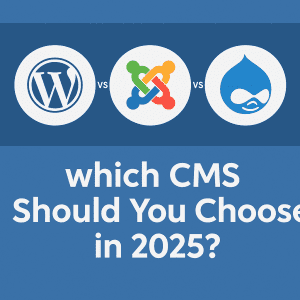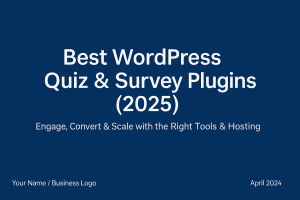You’ll find many business owners (or their e-commerce shot callers) that are proponents of having multiple domains for a single venture. Others will insist it’s an unnecessary expenditure if you utilize and position for your single domain with maximum effectiveness. For the average person, being able to make the correct determination here may well be beyond what they’re able to objectively determine, so let’s spend a little time this week to help those of you asking ‘is it better to have multiple domains and websites for a business?’
Here at 4GoodHosting, it’s our mix of solid hosting, competitively priced packages, and excellent customer support that makes us a good Canadian web hosting provider, but we feel another aspect that sets us apart is the level of insight we have into our industry and all of the subject offshoots that come from it that will be of interest to our customers.
Having multiple domains means carrying more than one website for the same company. The general logic is that it’s especially wise to do so if you have a product or service that appeals to different audiences. A site that’s tailored to the viewing / interacting / purchasing preferences of each respective target audience. Typically you will aim to customize the messaging, sales content and collaterals, and other marketing strategies so that they’re more likely to be ‘hooks’ for that demographic.
For example, a website for communications professionals will use a different approach than one for a staffing agency, for example, and this means that so a cross-over product (e.g., copy / scan / fax machines) might prove to be challenging to pitch effectively on a single site. It’s in these situations where the business will often consider having 2 (or more) sites with different domains so as to maximize the effectiveness with which they promote themselves to multiple specific buyer demographics.
From the SEO Standpoint Only
Should you take the decidedly narrow view and only consider search engine optimization (SEO), any reputable SEO expert will advise you that multiple domains can hurt your page ranking. That’s because having several keyword-rich domains pointing to your website is of no real specific benefit. SEO is directed towards a single domain name and will be regulated by site popularity, the volume and type of content featured, keywords located in meta and title fields – not to mention whether or not you’re paying or ‘sponsoring’ your spot in the ‘top 4’ at Google. What’s really most beneficial and should take precedence in your decision making process is taking into account the functionality of the site and how it specifically supports your goals. You should determine very specifically what is the exact role of your website (or sites) when choosing to use more than one URL.
Websites that can be identified as serving a simple purpose, like a portfolio of work for example, will be just fine using multiple pages on the same. Or they should be. If the business model is a little bit more multi-leveled, then considering multiple sites is warranted.
But now let’s have a look at where multiple domains for a website are suitable, and where they’re not. But before that let’s take quick stock of 3 considerations many people may overlook when starting to consider multiple domains:
- More work – For starters, each of these sites will require unique content, regular updates, and their own specific SEO optimization. You’ll be spending more time seated in front of the screen, for sure.
- Increased costs – Unless you’re going to shoulder all of that increased workload on your own, it’s almost certainly going to cost staff time, tech support, and don’t forget that outside vendors are now going to require a pair of paycheques. Yes, there can be economies of scale for hosting and other services to an extent, but that needs to be weighed against the value added to the goals for the sites.
- Organization – You’re going to have to do more as regards regular maintenance and content updates, plus you’ll have to ensure your marketing messages are consistent across all platforms, including the websites themselves.
Multiple Domains are Suitable When..
-
You Have A Single Business with Diverse Audiences
Most people won’t need to be reminded that 1-size does not fit all when it comes to communicating with different audiences online. Each group has its own set of needs and expectations about how products or services fit their needs. When an array of messages is required, separate sites makes it possible to tailor content as well as approach an individual group.
-
Your Niche Website Is Designed to Showcase a Specialization
Niche websites always tend to more appealing as compared to large, generic ones. Larger are prone to having too much overlap with a competing site, and this diminishes the likelihood of being able to get the value you need from links. Niche sites are ideal for allowing the kind of specialization that makes them helpful with complementing the information (or services) of other sites.
This in turn can support the development of deep, topic-specific content that then works to make your site a valuable (and linkable) resource. That of course goes a LONG way it you getting what you need out of your website
-
You Have High Turnover
Name changes are more common in certain industries. An accounting or law firm might change associates or partners, adding new names or removing that of a retiree. In addition, if an affiliation exists with a parent company, such as a broker with being part of a larger umbrella of multiple provincial or regional offices, wholesale changes can result from rebranding efforts and the like. In these and other cases, multiple domain names can be helpful in leveraging an established identity or geographic presence.
-
You’re Visible in Multiple Countries, with Multiple Languages
Those of you doing business in multiple countries might want to consider having separate sites for each geographic location. Localizing the colors, images, and content to match the social and cultural norms will serve to make your site much more user-friendly. Further, matching local preferences and habits can make it so that the URL is easier to find.
Multiple Domains are Less Suitable When..
-
Your Challenges in Managing Multiple Domain Sites are Primarily SEO related.
When it comes to page rankings, at the most basic level there is zero benefit to having multiple sites, while there very well could be negatives. Garnering bad links to phishing sites is one example, and if it occurs that requires significant technical troubleshooting.
-
People Are Have Difficulty Finding You
Most people are inclined to look up a company by name, and that means multiple domain names can make it difficult (or confusing) for a prospect or customer to find what they need.
-
Your Domain is Less Authoritative Due to Name Changes
Frequent changing of one or more of the domain names can hurt the site’s credibility.
-
Your Related Expenses are Problematic
As mentioned, the time and money that will be required of your for building and maintenance (including troubleshooting) increase in line with the number of sites you’re maintaining.
-
You’re Experiencing a Diluted identity
Depending on your brand, separating products and services between different sites could undermine the power and market influence of the company.
-
You’ve Got Merging Issues
Anyone who’s eyeing a possible merge into a single website will need to keep in mind that the migration needs to be done correctly (and that will come with significant expense).
All this said, it’s entirely true that a single website can support multiple product lines and services, but the catch is that it’s got to be decidedly easy to navigate
. That needs to be the primary motivation you’ve got to keep at the forefront in your mind, rather than focusing on the ease or low cost of design maintenance.
So, any feedback? Are you a multiple domain holder for your site(s) based on your type of business interests, or the nature of the business itself? Or is a single domain perfectly sufficient for your needs?















